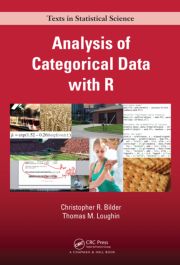Analysis of Categorical Data with R
Title: Analysis of Categorical Data with R
Authors: Christopher R. Bilder, Thomas M. Loughin
Publisher: CRC Press/Taylor & Francis Group, 978-1-4398-5567-6, © 2015, 547 pages
Features
- Provides descriptions and motivations of the analysis methods as well as worked examples with R code
- Highlights applications in a wide range of disciplines, including medicine, psychology, sports, and ecology
- Uses R not only as a data analysis method but also as a learning tool
- Discusses solutions to problems frequently mishandled in practice, such as how to incorporate diagnostic testing error into an analysis and how to analyze data from a complex survey sampling design
- Includes an introduction to R for inexperienced users
- Presents an extensive set of exercises at the end of each chapter
- Offers data sets, R programs, and videos on the book’s website
Solutions manual available upon qualifying course adoption
Summary
Learn How to Properly Analyze Categorical Data
Analysis of Categorical Data with R presents a modern account of categorical data analysis using the popular R software. It covers recent techniques of model building and assessment for binary, multicategory, and count response variables and discusses fundamentals, such as odds ratio and probability estimation. The authors give detailed advice and guidelines on which procedures to use and why to use them.
The Use of R as Both a Data Analysis Method and a Learning Tool
Requiring no prior experience with R, the text offers an introduction to the essential features and functions of R. It incorporates numerous examples from medicine, psychology, sports, ecology, and other areas, along with extensive R code and output. The authors use data simulation in R to help readers understand the underlying assumptions of a procedure and then to evaluate the procedure’s performance. They also present many graphical demonstrations of the features and properties of various analysis methods.
Web Resource
The data sets and R programs from each example are available at www.chrisbilder.com/categorical. The programs include code used to create every plot and piece of output. Many of these programs contain code to demonstrate additional features or to perform more detailed analyses than what is in the text. Designed to be used in tandem with the book, the website also uniquely provides videos of the authors teaching a course on the subject. These videos include live, in-class recordings, which instructors may find useful in a blended or flipped classroom setting. The videos are also suitable as a substitute for a short course.
